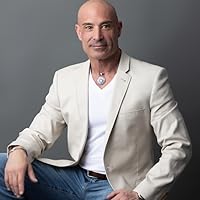Psychotherapy Quotes
Quotes tagged as "psychotherapy"
Showing 61-90 of 347

“If the world had more carers and sharers, we wouldn't need the services of therapists.”
― Corazon Calamidad: Obedient to None, Oppressive to None
― Corazon Calamidad: Obedient to None, Oppressive to None
“The whole idea is to put ourselves out of business as a therapist.
You want our clients to take our voice with them. We're modelling a style of thinking. Trying to have them learn a variety of coping skills whereby they can evaluate what works or what doesn't.
We're trying to turn our patients into their own therapist.”
― Stress Inoculation Training
You want our clients to take our voice with them. We're modelling a style of thinking. Trying to have them learn a variety of coping skills whereby they can evaluate what works or what doesn't.
We're trying to turn our patients into their own therapist.”
― Stress Inoculation Training

“The essential point of the preparative nature of psychotherapy in relation to magical practice is again reinforced two years later, in The Eye in the Triangle, where Regardie clearly notes that 'there must be no confusion between the two,' emphasizing that while therapy makes an excellent precursor to esoteric practice, the two are not identical.”
― Correspondences: Journal for the Study of Esotericism
― Correspondences: Journal for the Study of Esotericism

“Working with graduate students laid the foundation for my approach to clinical supervision. My commitment was to initiate the students into the counselling profession, to help them to develop the required theoretical and practical skills, to grow in self-awareness, to develop the relational skills that provided a sense of safety and security for those seeking help, and to gain confidence as an effective helper. It became clear to me that providing clinical supervision did not follow a linear path but rather had many twists and turns.”
― Practical Clinical Supervision for Psychotherapists: A Self and Relational Approach
― Practical Clinical Supervision for Psychotherapists: A Self and Relational Approach

“Josif Brodski je, jasno i ubedljivo, ovako objasnio: "Zlo je vulgarno. Koren svih zala je teorija da si ti bolji od nekog drugog. Ljudi misle da su bolji od drugih i da im pripada više nego drugima. Tu počinje zlo.”
― 50 pitanja i 50 odgovora iz hrišćansko-psihoterapeutske prakse
― 50 pitanja i 50 odgovora iz hrišćansko-psihoterapeutske prakse

“Sećam se Enrika Josifa, koji je jednom rekao: "Ne postoji Božija dobrota bez Božijeg gneva. Pridodavati Tvorcu gnev nije antropološka pridodavajuća vrlina. U Božijem gnevu leži najdublja tajna mističke, prečišćene Božije ljubavi," dok je hrišćanski svetitelj Tihon Zadonski upozoravao sentimentalne hrišćane ovako: "Đavo predstavlja čoveku samo Božije milosrđe, a izbegava pravosuđe Njegovo, da bi tako lakše navodio čoveka na greh i u gresima ga održao. Jeste Bog milostiv, ali je i pravedan.”
― 50 pitanja i 50 odgovora iz hrišćansko-psihoterapeutske prakse
― 50 pitanja i 50 odgovora iz hrišćansko-psihoterapeutske prakse

“Još je Dostojevski s pravom rekao da je đavolov trijumf kada postigne da čovek prestane da veruje u njega!”
― 50 pitanja i 50 odgovora iz hrišćansko-psihoterapeutske prakse
― 50 pitanja i 50 odgovora iz hrišćansko-psihoterapeutske prakse

“Jer šta se krije iza fanatične maske nesrećnog čoveka? Strah i osećanje velike slabosti, nesigurnost i potreba za natkompenzacijom osećanja inferiornosti (psihijatrijskim rečnikom, među fanaticima mnogo je neurotičara, psihopata i psihotičara) i, što je najgore, nevera u veru ili ideju koju ovakav čovek fanatično zastupa; u fanatika , najzad, jača bude vera u demonsku, nego u Božiju moć.”
― 50 pitanja i 50 odgovora iz hrišćansko-psihoterapeutske prakse
― 50 pitanja i 50 odgovora iz hrišćansko-psihoterapeutske prakse

“Kada govorimo o religiji (i hrišćanskoj religiji), nije teško prepoznati revnosne vernike. Kako ih prepoznati? Istinska revnost (dakle usrdnost, trud, živa želja) odaje se smirenošću i skromnošću, blagošću i opraštanjem, nepokolebljivom verom i nadom u Hrista Spasitelja (kada govorimo o hrišćanskoj religiji), verom koja se nikad i nikom ne nameće, razumevanje drugih ljudi, i to, razumevanjem i srcem i umom. Sve suprotno od ovih vrlina kojima Bog obdaruje Njegove revnitelje, prepoznaćemo u izrazu lica, ponašanju i delanju fanatičnog čoveka.”
― 50 pitanja i 50 odgovora iz hrišćansko-psihoterapeutske prakse
― 50 pitanja i 50 odgovora iz hrišćansko-psihoterapeutske prakse

“I za kraj, još jedna bitna razlika između revnosnog i fanatičnog čoveka: revnostan čovek celog života preobražava sebe, fanatičan - umesto ovakvog doživotnog, nesumnjivo trudnog napora - hoće da preobrazi druge.”
― 50 pitanja i 50 odgovora iz hrišćansko-psihoterapeutske prakse
― 50 pitanja i 50 odgovora iz hrišćansko-psihoterapeutske prakse

“Sve mi je slobodno, ali nije sve na korist; sve mi je slobodno, ali neću da što ovlada mnome (sv. Pavle u I Poslanici Korinćanima, 6,12).”
― 50 pitanja i 50 odgovora iz hrišćansko-psihoterapeutske prakse
― 50 pitanja i 50 odgovora iz hrišćansko-psihoterapeutske prakse

“Na jedna pitanja odgovor nećemo nikad dobiti i treba ih ostaviti autentičnim mističarima; na druga nećemo dobiti odgovor jer su površna, leteća, previše znatiželjna i raznovrsna. O njima najbolje govori Sveti Nikodim Agiorit (1748-1809) kad kaže: „Čuvati um od nekorisnog znanja i prazne radoznalosti. Interesovanje za mnogo stvari je često plod gordosti; to su zamke zlog duha koji pokušava da nas saplete radoznalošću...Raspredajući o visokim stvarima, zaboravljaju da čuvaju čistotu srca; gordost uma je gora od gordosti volje.” Ima, srećom, i trećih pitanja na koja jedino i dobijamo odgovor, a to su ona koja nas godinama istinski muče.”
― 50 pitanja i 50 odgovora iz hrišćansko-psihoterapeutske prakse
― 50 pitanja i 50 odgovora iz hrišćansko-psihoterapeutske prakse

“Nisam propustio, ipak, da zapazim šta je značila istinska vera, samim tim i snažna motivacija za fizički rad, kod onih medicinara sa kojima sam studirao, a koji su sa četrdesetak kilograma telesne težine postajali udarnici. Ništa im nije bilo teško da urade, nisu se razboleli od preteškog rada, a još su stizali da uče i da spremaju za večernje konferencije markstističke referate! To mi je bila prva vera i iskreno ubeđenje, kao što sam, još tada, naslutio na kojim temeljima počiva psihosomatska medicina, tj. kada se i zbog čega ljudi uopšte razboljevaju.”
― 50 pitanja i 50 odgovora iz hrišćansko-psihoterapeutske prakse
― 50 pitanja i 50 odgovora iz hrišćansko-psihoterapeutske prakse
“The goal of critical therapy is not just analysis or the adaptation and accommodation of the individual to oppressive systems and relationships. The goal is liberation, and in the process, we help to create more collaborative relationships, workspace, and environments and ultimately a more democratic society.”
―
―
“Love for the patient and with the patient is the ultimate gift of therapy. Both patient and therapist change as a result of this intimate relationship, developed over time amid stories of horror, anger, shame, fear, as well as beauty, hope and healing.”
―
―
“Therapeutically, conversations around self-worth and income are a necessary part of any good psychotherapy, even if the patient seems reluctant to bring them up at first. As psychotherapists know, it is never about the money but more about the feelings that money can hide.”
―
―
“[...] it would be far simpler if we could limit ourselves to examining the chemistry and physiology of [the patient's] brain, and to treating mental events as objects alien to our immediate experience, or as mere variables of impersonal statistical formulae. Important as these approaches are for the understanding for human behavior, they cannot alone uncover or explain all the relevant facts.To see into the mind of another, we must repeatedly immerse ourselves in the flood of his associations and feelings; we must be ourselves the instrument that sounds him.”
―
―
“[...] it would be far simpler if we could limit ourselves to examining the chemistry and physiology of [the patient's] brain, and to treating mental events as objects alien to our immediate experience, or as mere variables of impersonal statistical formulae. Important as these approaches are for the understanding for human behavior, they cannot alone uncover or explain all the relevant facts. To see into the mind of another, we must repeatedly immerse ourselves in the flood of his associations and feelings; we must be ourselves the instrument that sounds him.”
―
―

“It is beyond the learning of most psychotherapists to understand that suffering is how God turns some peoples’ minds toward Her. Some therapists, psychologists and psychiatrists reading this, may have been feeling a particular despair and/or frustration in working with certain patients, because they cannot seem to help them with their pain. These are often special cases in which the patient is being treated by Allah; and the treatment sometimes is quite severe. This is because it is easier to awaken from a nightmare than a pleasant dream. In fact, one of the functions of nightmares is to awaken us if we have a stomachache or other physical problem, or there is something in the environment that needs our attention. So too, the nightmare 'world' that we believe to be our everyday, ordinary, waking world, serves to jolt us awake serves to enlighten us, and makes us realize that what we mistook for the real world, was in fact, only a dream!”
―
―

“在我接受心理治疗师的专业培训时,曾听督导说过,“每个人都有可爱之处。”我后来惊讶地发现,她说得没错。如果你能深入了解某个人,就不可能不对他产生好感。我们应该把全世界的宿敌们都请到同一个房间里,让他们分享各自的过往和成长经历,说说内心的恐惧和挣扎,也许他们立刻就能和谐共处了。”
― Maybe You Should Talk to Someone
― Maybe You Should Talk to Someone

“We all have made the mistake of thinking someone else can be our healer, our thriller, our filling. It takes a long time to find it is not so, mostly because we project the wound outside ourselves instead of ministering to it within.”
― Women Who Run With the Wolves
― Women Who Run With the Wolves

“There is a hidden beauty in all suffering that leads to catharsis and transformation.”
― You Are Still Alive, Now Act Like It: Empower, Elevate, and Enlighten Your Consciousness
― You Are Still Alive, Now Act Like It: Empower, Elevate, and Enlighten Your Consciousness

“Завдання психотерапії полягає не в тому, щоб довести, що ви добрі люди, а в тому, щоб ви усвідомили, що завжди такими були.”
― Емоційні гойдалки війни. Роздуми психотерапевта про війну
― Емоційні гойдалки війни. Роздуми психотерапевта про війну
“Whilst trauma is everywhere, so is resilience. And in fact, as you’ll come to see, the good stuff is more important than the bad.”
―
―
“Psychotherapy only has social meaning; its pervasiveness is explained not by what it does with patients in the clinic but rather by its ideological content - its affirmation of central social values, notably a misguided sense of individualism that is disingenuously heroic and that may be socially destructive.”
― Psychotherapy As Religion: The Civil Divine In America
― Psychotherapy As Religion: The Civil Divine In America
“[T]he entire field is pseudoscientific and best understood as an elaborate mysticism only differentiated from frank religion, even its crackpot fringes, by seemingly modern orientation and the cant of science.”
― Psychotherapy As Religion: The Civil Divine In America
― Psychotherapy As Religion: The Civil Divine In America
All Quotes
|
My Quotes
|
Add A Quote
Browse By Tag
- Love Quotes 97k
- Life Quotes 75.5k
- Inspirational Quotes 72.5k
- Humor Quotes 43.5k
- Philosophy Quotes 29.5k
- Inspirational Quotes Quotes 27k
- God Quotes 26k
- Truth Quotes 23.5k
- Wisdom Quotes 23.5k
- Romance Quotes 23k
- Poetry Quotes 22k
- Death Quotes 20k
- Happiness Quotes 18.5k
- Life Lessons Quotes 18.5k
- Hope Quotes 18k
- Faith Quotes 18k
- Quotes Quotes 16.5k
- Inspiration Quotes 16.5k
- Spirituality Quotes 15k
- Religion Quotes 15k
- Motivational Quotes 15k
- Writing Quotes 14.5k
- Relationships Quotes 14.5k
- Life Quotes Quotes 14k
- Love Quotes Quotes 13.5k
- Success Quotes 13.5k
- Time Quotes 12.5k
- Motivation Quotes 12k
- Science Quotes 11.5k
- Knowledge Quotes 11k


